by Venchito Tampon Jr | Last Updated on October 24, 2021
What are authority links?
Authority links are links found on a webpage with an established trust and authority to drive targeted traffic to a website that can help the brand achieve its business objectives.
Getting these authority links is tough. It requires hard work, creativity and persistence to find, pursue and connect to publishers and industry linkers who are interested in citing or referencing your content as a trusted resource to follow.
Link building is not for the faint-hearted marketers.
After all, if a link can be easily acquired by everyone else, it shouldn’t be called an “authority”.
However, despite its difficulty, online marketers still pursue this type of links as it can positively impact a website in many ways, such as:
- Sending targeted traffic to your page
- Generating leads and sales from referred traffic
- Improving search visibility of your page by making it rank for industry keywords
- Providing more link opportunities to your content (organically from researchers who can potentially cite you as a credible source of information)
- Creating brand awareness (as you’ll be linked alongside with influencers and big content creators).
“Authority” is pretty much subjective depending on what factors you consider.
But whether it is relevance or benchmark metrics such as Ahrefs DomainRank, it is important to understand what types of links are deemed to be authoritative. Given that this will be the roots of your link building approaches – your “how” in getting links.
Types of Authority Links
Links from .edu and .gov sites
The legitimacy of an educational and governmental institution/organization being able to register a .edu/.gov domain is a way of the Internet preserving the authority and trust of this type of websites.
Although there remains a debate over the true value of .edu and .gov extensions, I strongly believe that what makes these sites authoritative is the information found on their pages. Incorrect, spammy or misleading details may lead to some drastic consequences on its end users (website visitors).
Authority .edu and .gov sites are hard-to-replicate links. Restrictions as to how relevant your page/site is to their own resource page make it more difficult for your competitors to get the same types of links – unless they’ve created a better version of your content or is associated in the same organization your brand belongs to (e.g. for local professional organizations).
Links from ranking pages for thematic keywords
The most powerful links on the web are the ones that can directly send relevant traffic to your site.
Ranking pages for targeted industry terms are great sources of new traffic from searchers looking for relevant information.
Acquiring links from them can drive consistent visitors to your site (not just one-time off – as what happens to a one-time guest post publishing).
Here are a few tips to getting links from rankings page:
Target relatively new resource pages. They are more receptive to outreach pitches than old links pages that haven’t been updated for year.
Given that they have just started curating topical resources/references, they are open for resource link requests.
Start your search with queries like, “inurl:resources “keyword” or “inurl:links.html “keyword”. Then set a time to past year/custom range (Tools – Time).
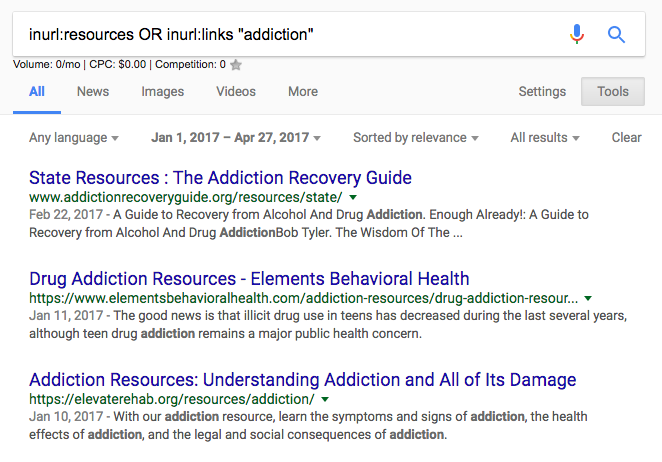
Contribute early to new industry publications. Investing early on topically relevant blogs (with high potentials for audience growth) by supplying them with regular content is a great technique to scale your link development efforts.
Because you’ll get higher approval rates as a columnist to contribute to low-authority (with high velocity for growth) publications compared to a high-tier news site in your industry.
Check the blog’s potential for growth using Ahrefs or SEMRush organic data.
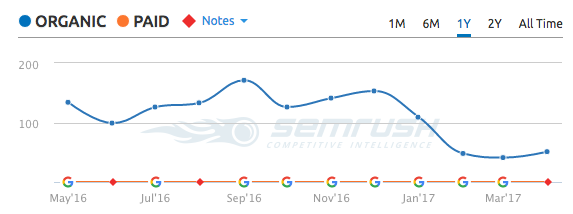
Begin this approach with your typical guest blogging queries. Then do the same process above (set a time to past year/custom range) to filter recently published “write for us” pages.
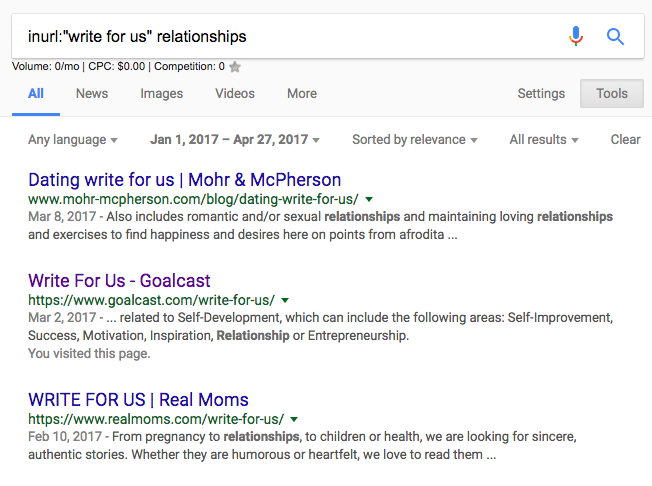 (hat tip to Jason Acidre for this technique)
(hat tip to Jason Acidre for this technique)
Further reading: Definitive Guide to Guest Blogging
Offer to update a static page. Informational content ranking for highly-searched terms should constantly be updated to satisfy its searchers’ intent, especially if the content requires the timeliness of the information (i.e. 2017 trends/updates).
This is where you can add value to the content creator by helping him update the page with new information and by adding other content formats (visuals, transcripts for video/audio, tables, etc..) – needed to make it 10x better than its competitors.
Links from top-tier news sites
Getting featured on A-spot blogs (media sites) can’t easily be replicated by your competitors because it requires relationships to make it happen.
If you have built connections with existing contributors from top-tier news sites, it’d open opportunities for your brand to be referenced as an authority expert in the industry.
Links coming from them (top-tier news sites) like Forbes is a great way to establish your brand’s authority.
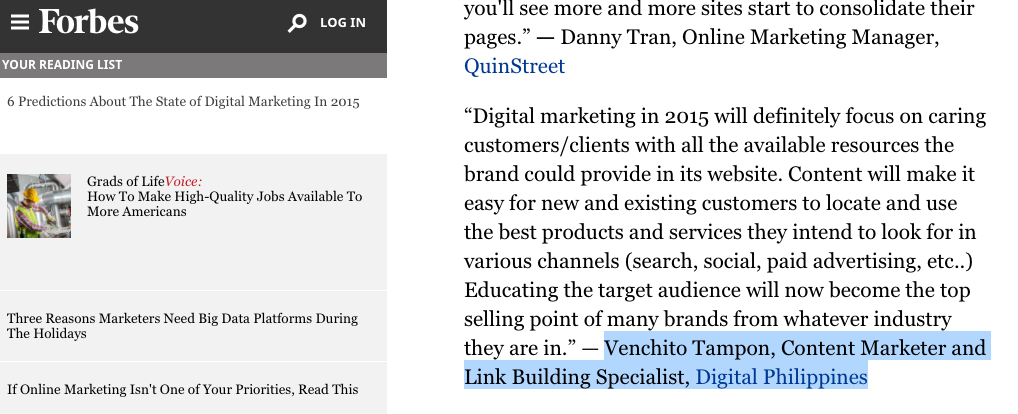
You can also add social proofs to your signature or email pitches when reaching to mid-level or high-tier blogs for content partnerships to build your site’s
Links from topically relevant websites
Consider a prospect page’s relevance to your site above everything else. You’ll find pages hosted on domains with low Moz DA but should be considered as highly valued link prospects since they can pass human’s eye tests – great user experience, satisfying content and with promising search traffic growth (which can be measured using SEMrush/Ahrefs).
See this DA11 finance blog as an example.
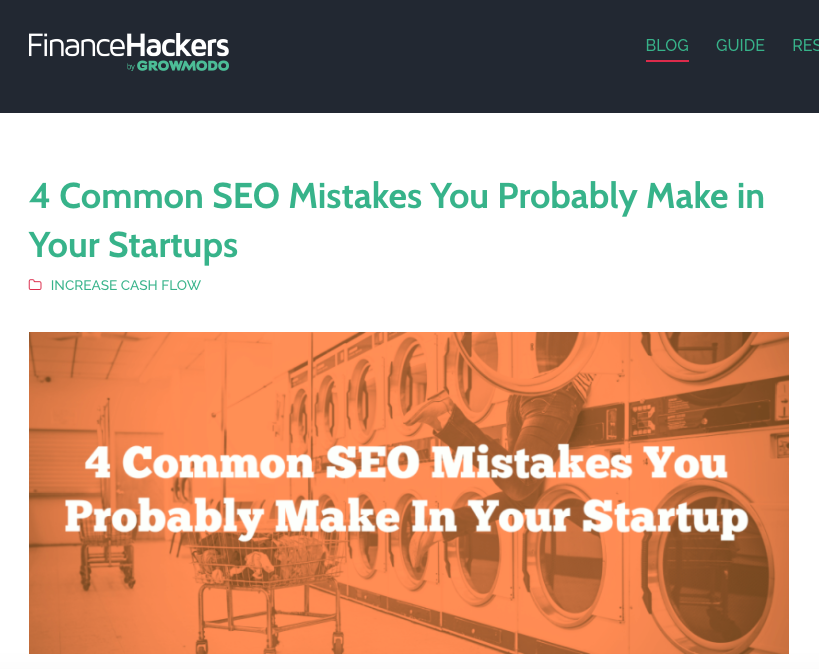 I liked the three primary reasons Jon Cooper listed why SEOs and link builders should consider prospecting for relevant blogs/sites:
I liked the three primary reasons Jon Cooper listed why SEOs and link builders should consider prospecting for relevant blogs/sites:
- Looking at relevance gives you more room for larger pools of link prospects.
- Relevant links have a bigger impact on the algorithm.
- Webmasters are more likely to award you with a relevant link since it makes sense for their audience.
You need to start prioritizing relevance today as your primary metric in link prospecting.
Links that generate business conversions
Links that are sending qualified conversions to your website are link types and sources you should replicate over time – as they directly affect your online business’ revenue growth.
Aim to get recurring links from these websites to increase more assisted conversions generated in your brand.
On Getting Authority Links
Authority links are hard to get. But if you’ll able to acquire them for your site, it would tremendously impact your site’s search rankings – helping you dominate the market you are competing in.
Authority link development requires either branding and/or content.
Summing them up is a powerful combination for link authority.
1. Perceived Branding
There are online businesses that don’t need 10x content to start getting brand awareness and establishing brand authority, as they have built it already using offline marketing platforms, such as advertising on billboards, television ads, and other offline marketing channels.
They have branded searches which enable them to generate leads and sales offline without having to depend purely on organic industry rankings.
If you are a consultant or an agency, getting clients who are widely known in a particular niche is a clear advantage on your end to develop authority links.
Because people are aware of the brand’s name, pitching publications and authority sites (.edu and .gov domains) for guest blogging, resource inclusion and broken link building are much easier to facilitate.
Ways to use perceived authority to get links:
A. Link reclamation
Find publishers who have mentioned your brand or product but haven’t linked to you. You can use BrandMentions to track them.
Then politely pitch them and ask for link attributions.
This technique has been covered many times, so here’s a guide you can check out that walks you through the entire process.
B. Interview opportunities
Use your branding to cover more interview opportunities wherein you can also obtain authority links to your site.
Make your existing press mentions and features of your brand as social proofs when pitching to industry publishers who’re looking for guests on their show (podcasts). The more credible you are as a brand, the higher the probability they’ll get you (or your client) as a guest for their show.
C. Incentivize social sharing in exchange of linking
If you’ve had a huge fan base in your social accounts, you can start using it as a value proposition when reaching out to bloggers in your space. Ask if they’d be willing to be featured on your social profiles (as long as their content feature provides useful information). In exchange, get an authority link from one of their pages.
D. Speaking gigs for natural linking opportunities
If your client is into public speaking, it’s best to check if you’re getting natural authority links from speaking pages/profiles of event organizers’ websites. There’ll be times where they’ll be linking to broken URLs/domains.
You can also monitor publishers who link to your client’s slide presentations and Slideshare profile and ask if they can cite your client’s website as a source.
 Chris Dyson wrote a guide on how to reclaim links from content creators that used your visual assets.
Chris Dyson wrote a guide on how to reclaim links from content creators that used your visual assets.
More reading: Using Brand Building Strategies to Improve Link Building
2. Content-based Link Acquisition
If perceived authority is missing in the formula, you can still get authority links by producing 10x content assets.
Smaller brands can win over big brands with an effective strategy to produce more content assets that can attract organic links.
As coined by Rand Fishkin, 10x content simply refers to content that is 10 times better than the best result that can currently be found in the search results for a given keyword phrase or topic.
Jason Acidre wrote a great piece on his own 10x content creation process (I advised you to check it out).
Here are a few effective techniques to acquire authority links using content:
A. Broken dead domain link building
Broken link building is a concept of pointing out broken links to webmasters, with the hopes that they’ll be open for requests to add your link, whether as a direct replacement for a previously broken link or as a new addition unrelated to the broken ones.
Here are some useful resources to get started with broken link building:
- All-in-one broken link building workflow
- The broken link building bible by Russ Jones
- Inverted broken link building strategy by Ahrefs
Maximize this link building approach further by observing what other similar resource pages have been getting organic links (quietly) in your space. They’ve gotten links you haven’t acquired yet that I’ve found, in most cases, can’t easily be found through Google search.
Track dead content (broken links) on resource pages using LinkMiner.
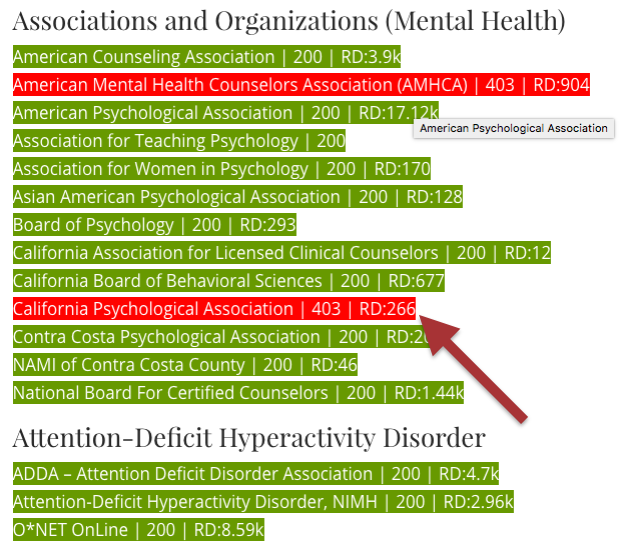 Set the options to display the number of referring domains for each external link.
Set the options to display the number of referring domains for each external link.
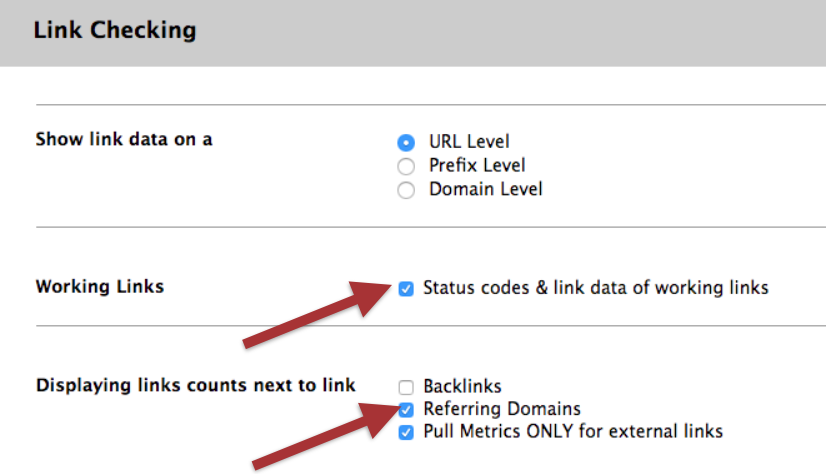 Check if the link is broken and if it does, do research further if it’s just a specific URL or prefix that isn’t working or the whole domain itself.
Check if the link is broken and if it does, do research further if it’s just a specific URL or prefix that isn’t working or the whole domain itself.
For instance, this video addiction content that I’ve found on a links page is part of the whole domain that isn’t working.
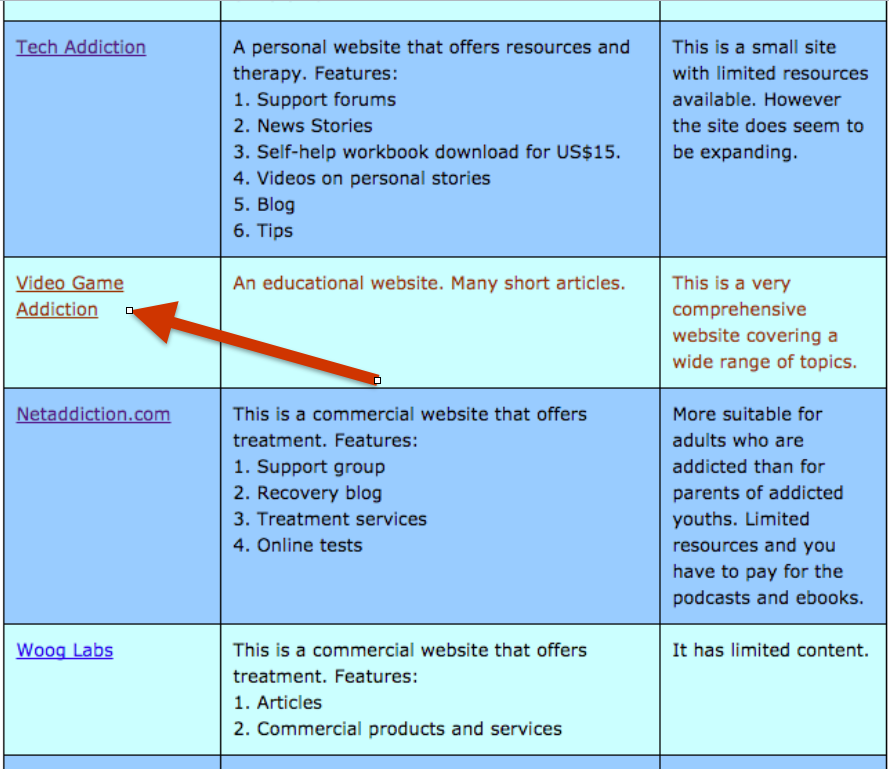
Gather resources/links pages pointing to the whole domain, not just to the specific broken content. Because there are other content in the site that gained high-authority links from other linkers as well – which provides you more link opportunities at one hand.
You can filter the results by link type (educational) to quickly extract .edu resource pages. Also, do quick searches for “link” or “resource” on Ahrefs referring domain search bar to easily get the same type of link opportunity (links pages).
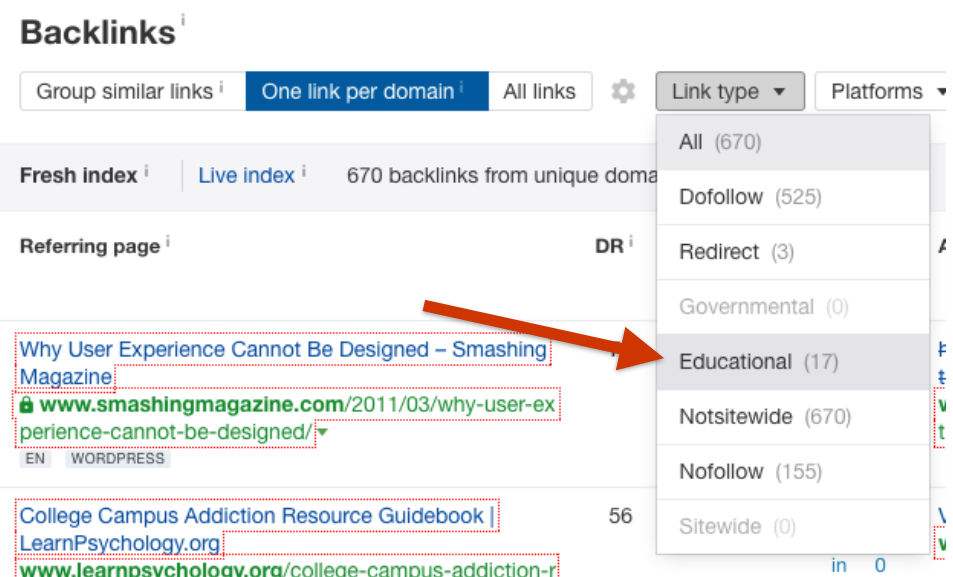
Reach out to webmasters letting them know of the broken content they’ve linked to from their pages. Then suggest your relevant content as a replacement to their defunct link.
To increase the efficiency of your outreach management work, it’s best to stalk your A-list sole operator webmaster and see if they have social accounts you can pitch to – straight to get their personal email addresses.
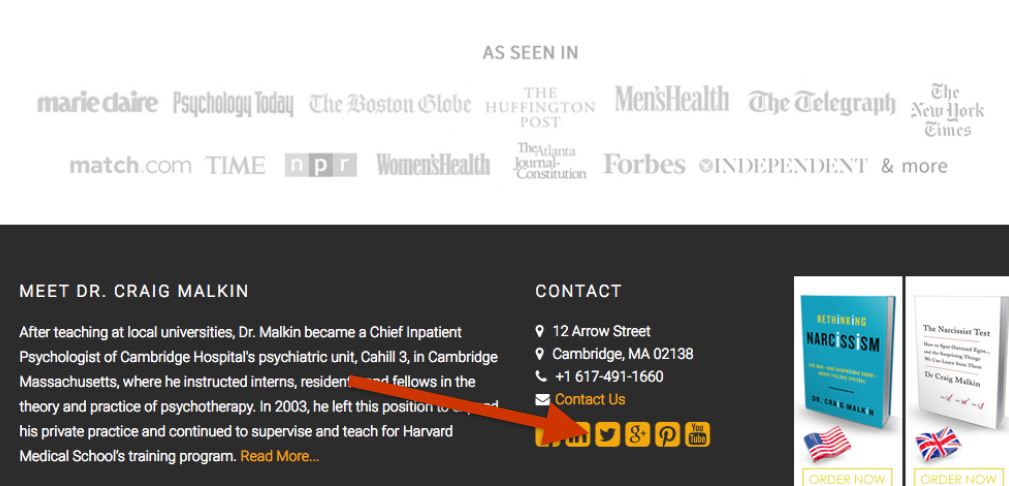
I’ve found this effective for personal blogs (with only one webmaster/operator) and for sites with no visible email addresses.
Instead of sending follow-ups to receive a response, you can directly ask them for a contact email they regularly use. Because other webmaster has more than one email address – you may be pitching to one that isn’t working anymore.
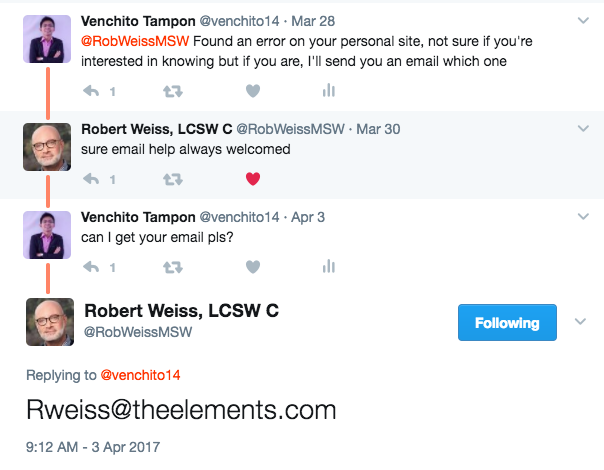
Plus, this allows you to see their interest to get help from you in providing errors found (broken links) found on their webpage.
Then acquire links:
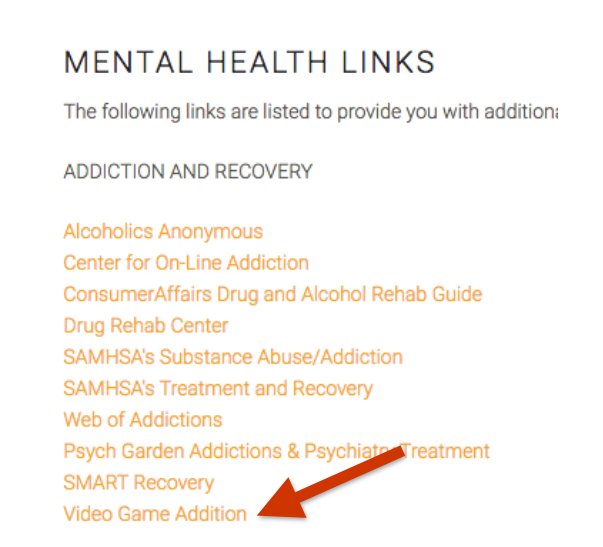 B. Reverse engineer new content assets with highest link growth
B. Reverse engineer new content assets with highest link growth
Reverse engineering other people’s content assets has been a standard practice in the link building space.
Since publishers/content creators have linked/shared a competitor’s content (or a website with a similar content of yours), you’ll have better chances of acquiring a link to your content – especially when your content is 10x better than what your competitors have.
Start by finding competitors’ content that are similar to the assets you already have.
But don’t stop from there. Find other non-competing but relevant websites with high-performing industry guides (those that received a substantial amount of high-quality backlinks).

Analyze their backlink growth further by checking the page’s link velocity. This approach allows you to get insights on how long have they’ve been building links or have been picking up links organically.
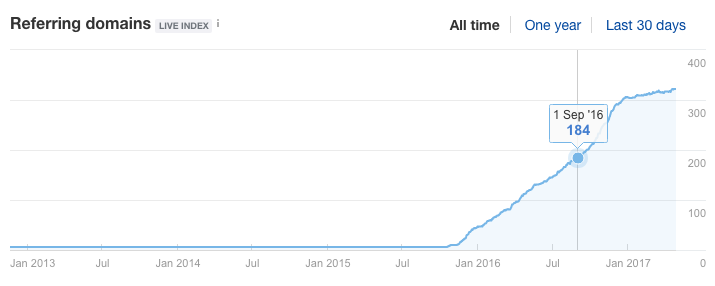
Because if they’ve acquired authority links just recently, their existing linkers are still at the stage of updating their pages/sites. When you reach out to them, you’ll have a higher probability of receiving positive responses.
You might also find other linkable audiences where they’ve been able to secure links that you might as well consider for link prospecting.
C. Linkable market analysis
Linkable audience is a group of resource curators who would benefit from specifically tailored information on a topic.
Starting a link development campaign by identifying linkable markets in the space can give you a better idea if a particular content topic is worthy to pursue for content creation. It is a guarantee on your end that there are audiences willing to link to your content asset, once it’s been created.
There are two ways to assess linkable markets in your industry:
Check the number of unique referring domains to ranking pages for industry terms
You can use Mozbar to see if there are pointing links to pages ranking in search results.
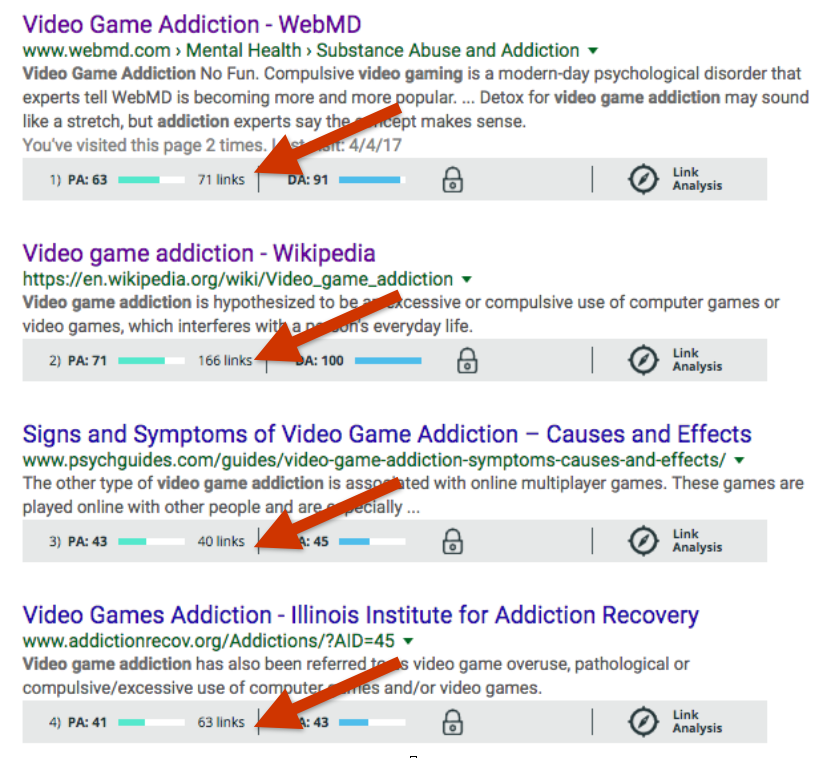
You may have to analyze further these links to see if they’re coming from legitimate websites/pages.
Intersect existing linkable audiences to your brand’s theme
Garett French created a list of 601+ linkable audiences whom you can serve with your content. If you can intersect your brand’s mission with different linkable markets, you’ll be able to generate more link opportunities for your website.
For example, this drugs rehab site published several pieces of content targeting different linkable audiences.
1. A Substance Guide for Parents
Linkable audience: Parents of teens who are struggling with substance/drugs.
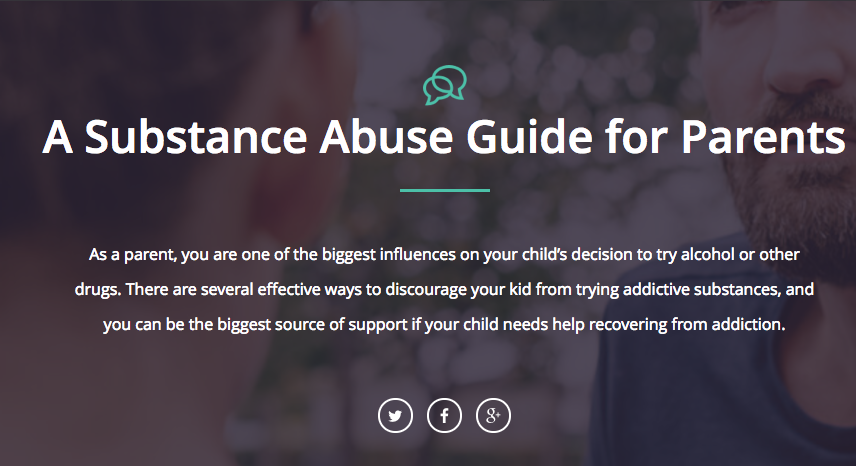
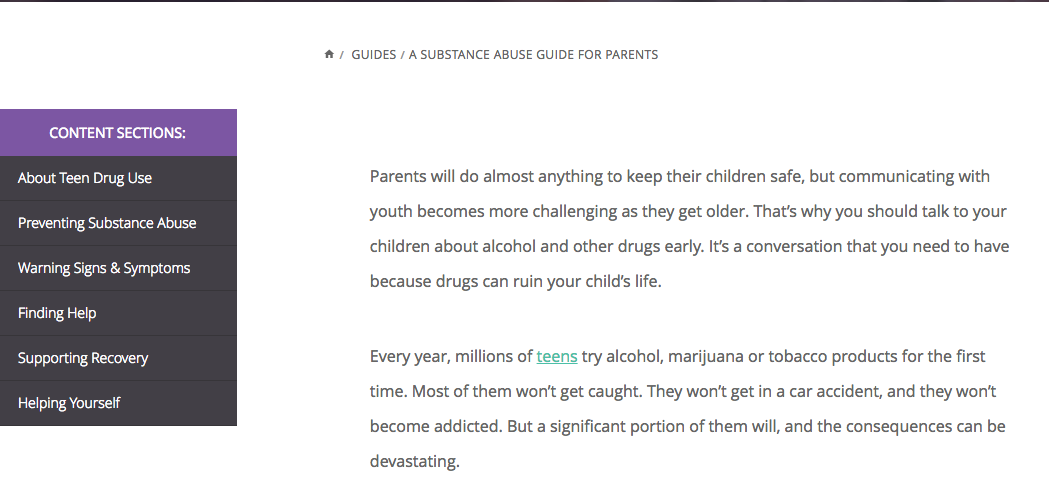
2. Bullying and Substance Abuse: Who It Affects and Why
Linkable audience: People concerned about bullying in schools.
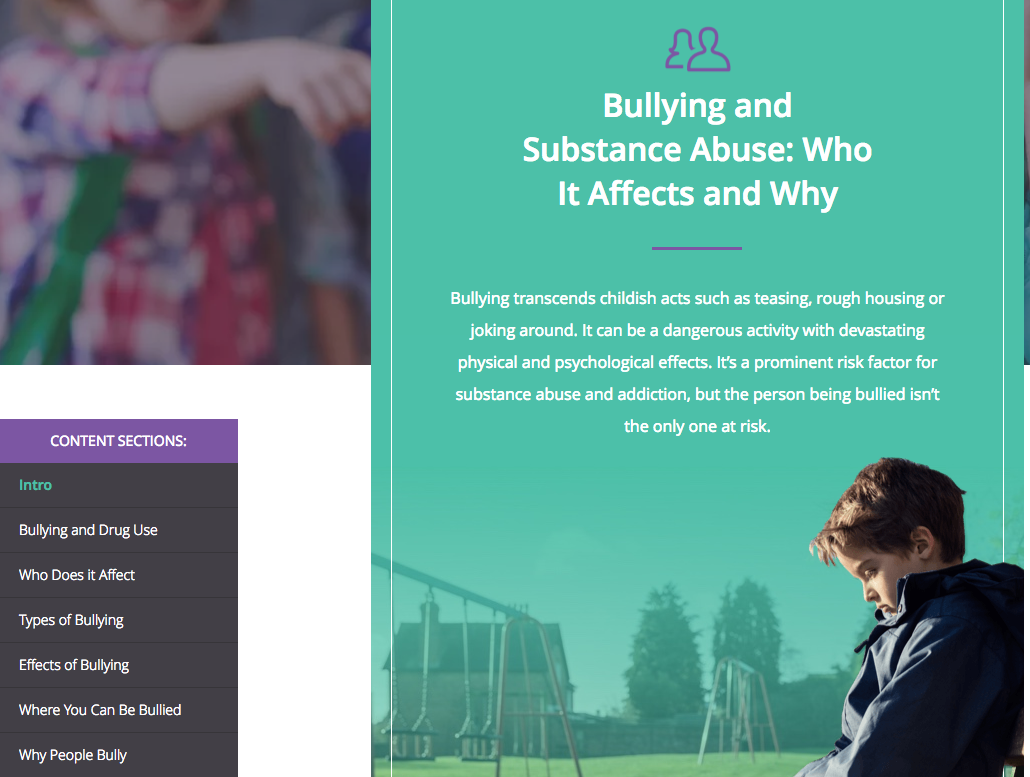
3. Degrees for Mental Health and Addiction Professionals
Linkable audience: Job seekers in the mental health and addiction niche
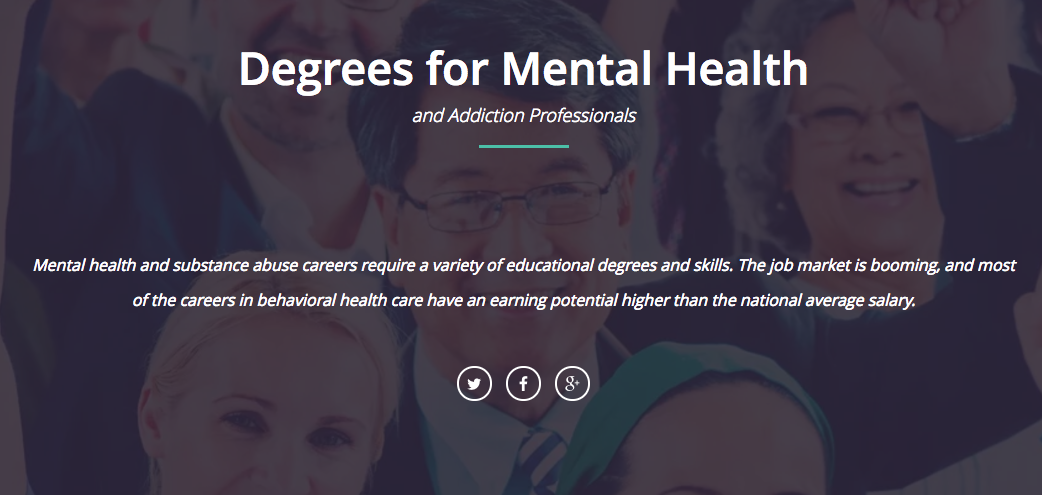
Linkable audiences:
- Parents of LGBT teens
- Parents of LGBT adults
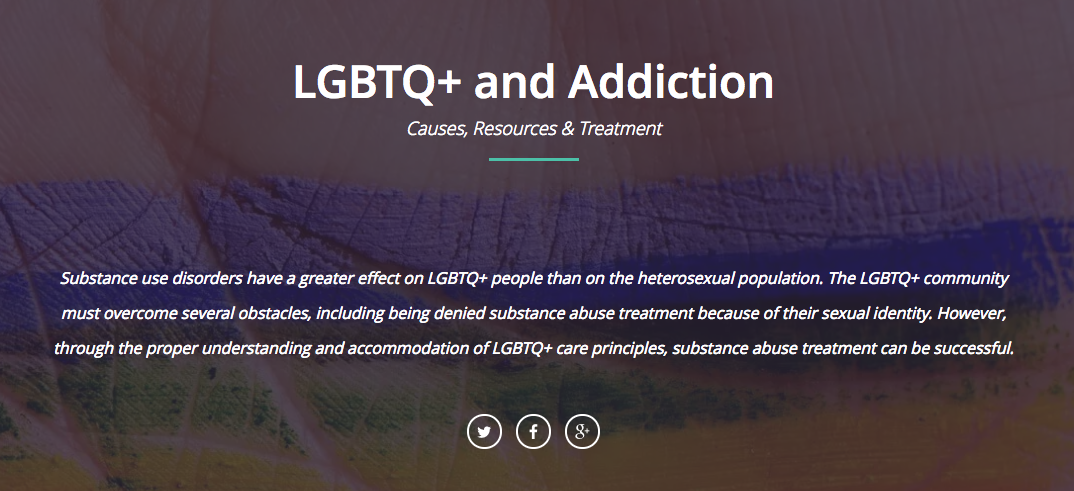
You may notice that these audiences served by resource curators (not necessarily bloggers/journalists, etc..) fall into one of these categories:
- a person in need, or a person who cares for a person in need
- a person seeking out information
If your clients have content pieces that are targeted to specific linkable audiences, you’ll have higher chances of acquiring consistent amount of authority links every month.
Further Reading:
The Author
Venchito Tampon Jr
Venchito Tampon is a Filipino Motivational Speaker, Corporate Trainer, and a Leadership Speaker in the Philippines. He is the CEO and Co-Founder of SharpRocket, a link building agency. With a decade of experience, Venchito has a proven track record of leading hundreds of successful SEO (link builidng) campaigns across competitive industries like finance, B2B, legal, and SaaS. His expert advice as a link building expert has been featured in renowned publications such as Semrush, Ahrefs, Huffington Post and Forbes. He is also an international SEO spoken and has delivered talks in SEO Zraz, Asia Pacific Affiliate Summit in Singapore, and Search Marketing Summit in Sydney, Australia. Check out his other businesses, Hills & Valleys Cafe, Blend N Sips and Saas Pursuit.
How our LINK BUILDING AGENCY builds 250 links/mo consistently using Predictable Link Building Methodology™…
- Using a SIMPLE and PROVEN system
- Using a SCALABLE strategy
- No private blog networks
- No creepy outreach emails
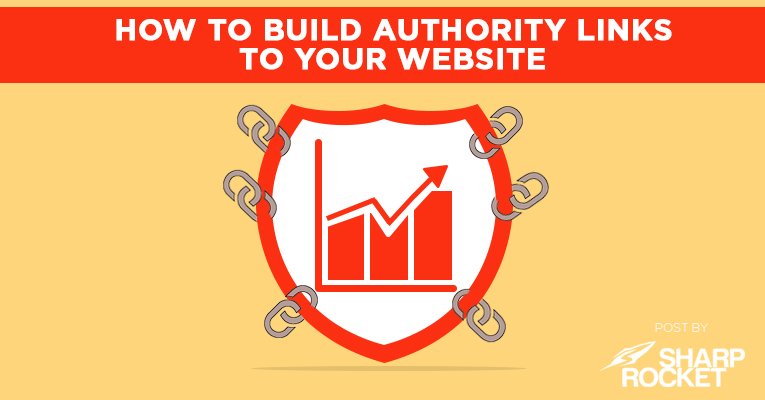
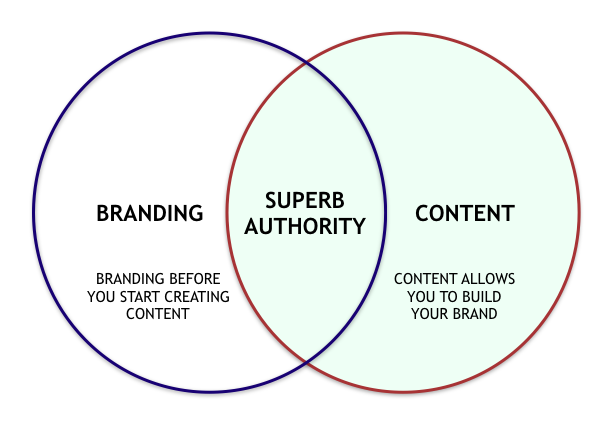
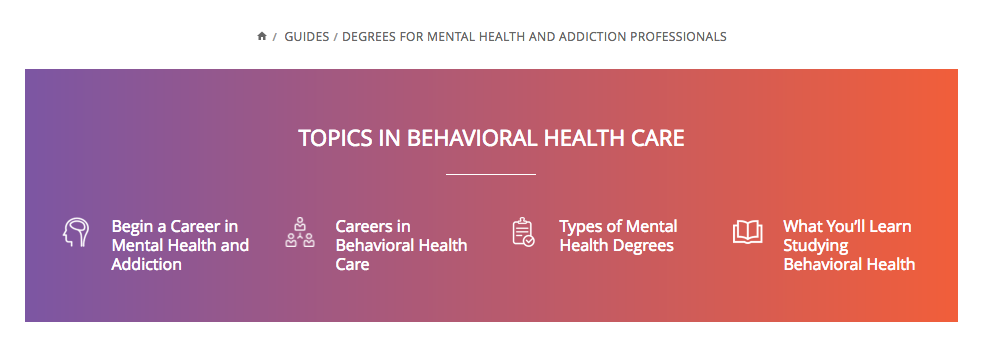 4.
4. 